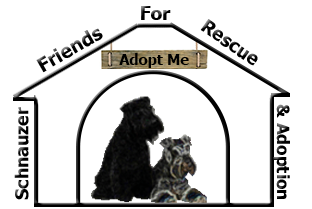

A Non-Profit 501(c)(3) Organization
Copyright © 2008-2025 All Rights Reserved
SFRA is a 501(c)(3) Non-Profit Organization
and is NOT associated with any other
Cincinnati-based rescue organization.
and is NOT associated with any other
Cincinnati-based rescue organization.
Website developed and maintained by
Website to the Rescue
Website to the Rescue
Ways you can help our Organization
Our on-going needs:
Towels
Bedding
Blankets
Flea and Heartworm preventatives
Nutro Natural Choice Lamb and Rice Dry Dog Food
Gift Cards to PetSmart or online gift certificates to national pet supply vendors are always appreciated. If you wish to support a specific rescued dog or foster mom, just designate which one, and we will see that it gets to them.
Hold a garage or yard sale and donate part of the proceeds.
Use GoodSearch.org for your online searches-they are supported by the Yahoo search engine and we are paid for each search that you do! Download their search toolbar at GoodSearch.org, select Schnauzer Friends for Rescue and Adoption as your charity, and search away! Doesn’t cost you a thing and we benefit!
Auction through Ebay! Select SFRA as a beneficiary through Ebay/Mission Fish.org’s donation program and you can select a percentage of your proceeds to be donated directly to SFRA -- they handle it all for you!
Cash donations are greatly appreciated as the adoption fee rarely covers the cost of Vet Care when we bring in a new Rescue.
Your cash donations will help cover costs for:
Hold a garage or yard sale and donate part of the proceeds.
Use GoodSearch.org for your online searches-they are supported by the Yahoo search engine and we are paid for each search that you do! Download their search toolbar at GoodSearch.org, select Schnauzer Friends for Rescue and Adoption as your charity, and search away! Doesn’t cost you a thing and we benefit!
Auction through Ebay! Select SFRA as a beneficiary through Ebay/Mission Fish.org’s donation program and you can select a percentage of your proceeds to be donated directly to SFRA -- they handle it all for you!
Cash donations are greatly appreciated as the adoption fee rarely covers the cost of Vet Care when we bring in a new Rescue.
Your cash donations will help cover costs for:
Vaccinations / Deworming
Spay / Neuter
X-Rays
Blood Work
Heartworm Tests
Heartworm / Flea Preventative Meds
Dental Care
Plus much, much more
How to Donate:
You can send your donations (Supplies, Gift Certificates, or Checks to:
Schnauzer Friends Rescue and Adoption
10558 Mill Road
Cincinnati, OH 45240
Or you may also make a cash donation using PayPal or Network for Good with just a few mouse clicks. Just click one of these donate buttons.
You can send your donations (Supplies, Gift Certificates, or Checks to:
Schnauzer Friends Rescue and Adoption
10558 Mill Road
Cincinnati, OH 45240
Or you may also make a cash donation using PayPal or Network for Good with just a few mouse clicks. Just click one of these donate buttons.
DONATE SUPPLIES OR FUNDS
SPAY AND NEUTER YOUR PETS
Health Benefits:
Female Dogs
Spaying removes the ovaries and uterus, so this eliminates the possibilities of ovarian and uterine infection or cancer. Bacterial infection of the uterus (pyometra) commonly afflicts older unspayed cats and dogs. In its advanced stages, pyometra causes general illness and kidney failure. If the uterus ruptures the animal will probably die. Pyometra requires emergency spaying, which may not save the animal. The best preventive care is to spay dogs and cats when they are young and healthy.
Spaying can also prevent mammary gland tumors, the most common tumor in unspayed female dogs and the third most common tumor in cats. They are more common in dogs than in humans. A high percentage of mammary tumors are cancerous: in dogs, nearly 50%; in cats, nearly 90%. Once a cancerous mammary tumor spreads to the bones or lungs, the cancer will be fatal. An unspayed dog is 200 times more likely to develop mammary tumors than a dog spayed before her first heat. An unspayed cat is 7 times more likely than a spayed cat to develop mammary tumors.
Spayed dogs and cats also avoid the dangers of giving birth. A narrow birth canal or inadequate body size can sometimes make giving birth perilous.
Health Benefits:
Female Dogs
Spaying removes the ovaries and uterus, so this eliminates the possibilities of ovarian and uterine infection or cancer. Bacterial infection of the uterus (pyometra) commonly afflicts older unspayed cats and dogs. In its advanced stages, pyometra causes general illness and kidney failure. If the uterus ruptures the animal will probably die. Pyometra requires emergency spaying, which may not save the animal. The best preventive care is to spay dogs and cats when they are young and healthy.
Spaying can also prevent mammary gland tumors, the most common tumor in unspayed female dogs and the third most common tumor in cats. They are more common in dogs than in humans. A high percentage of mammary tumors are cancerous: in dogs, nearly 50%; in cats, nearly 90%. Once a cancerous mammary tumor spreads to the bones or lungs, the cancer will be fatal. An unspayed dog is 200 times more likely to develop mammary tumors than a dog spayed before her first heat. An unspayed cat is 7 times more likely than a spayed cat to develop mammary tumors.
Spayed dogs and cats also avoid the dangers of giving birth. A narrow birth canal or inadequate body size can sometimes make giving birth perilous.
Male Dogs
Neutering removes the testicles, which prevents testicular tumors and greatly reduces the risk of developing rectal tumors. A dog who develops a testicular tumor must be treated before the tumor spreads -- the only effective means is neutering. Testicular tumors are especially prevalent in older dogs and are the second most common tumor in male dogs.
Enlargement of the prostate gland affects over 60% of unneutered male dogs older than five years. Prostatic enlargement predisposes a dog to prostate and urinary-tract infections, which can make urinating difficult and painful. If an infection leads to an abscess, the abscess must be surgically drained. Common consequences of the surgery include system wide infection and shock or sometimes death. Because prostatic enlargement is caused by the male hormone testosterone, and testosterone is produced by the testicles. Neutering acts as both a preventative measure and a cure.
Additionally, by eliminating the sexual drive that can cause a dog to bolt from the yard or house, neutering helps protect dogs from injuries associated with roaming, such as being hit by a car or infections transmitted by other animals.
Neutering removes the testicles, which prevents testicular tumors and greatly reduces the risk of developing rectal tumors. A dog who develops a testicular tumor must be treated before the tumor spreads -- the only effective means is neutering. Testicular tumors are especially prevalent in older dogs and are the second most common tumor in male dogs.
Enlargement of the prostate gland affects over 60% of unneutered male dogs older than five years. Prostatic enlargement predisposes a dog to prostate and urinary-tract infections, which can make urinating difficult and painful. If an infection leads to an abscess, the abscess must be surgically drained. Common consequences of the surgery include system wide infection and shock or sometimes death. Because prostatic enlargement is caused by the male hormone testosterone, and testosterone is produced by the testicles. Neutering acts as both a preventative measure and a cure.
Additionally, by eliminating the sexual drive that can cause a dog to bolt from the yard or house, neutering helps protect dogs from injuries associated with roaming, such as being hit by a car or infections transmitted by other animals.
DONATE YOUR TIME
Become a Foster Parent for Schnauzer Friends Rescue and Adoption. Click here to fill out an application. (In place of dogs name, fill in foster parent.)
What does it mean to be a Foster Parent? Click Here to learn more.
Become a Foster Parent for Schnauzer Friends Rescue and Adoption. Click here to fill out an application. (In place of dogs name, fill in foster parent.)
What does it mean to be a Foster Parent? Click Here to learn more.
Behavioral Benefits:
Spaying prevents irritability and aggressiveness that some dogs show while in heat. For indoor dogs, this also prevents vaginal blood spots from getting on household furniture or the carpet.
In many male dogs, neutering reduces or eliminates sexual mounting behavior and territorial marking with their urine (including any that might take place in the house.
Spaying prevents irritability and aggressiveness that some dogs show while in heat. For indoor dogs, this also prevents vaginal blood spots from getting on household furniture or the carpet.
In many male dogs, neutering reduces or eliminates sexual mounting behavior and territorial marking with their urine (including any that might take place in the house.
FREQUENTLY ASKED QUESTIONS
Q1. Is spay/neuter surgery painful? Is it dangerous?
A. During spaying/neutering, dogs and cats are fully anesthetized, so they feel no pain. After surgery they may experience some discomfort, but this disappears in a few days or hours. As with any surgery complications are possible, but rare.
Q2. Is spay/neuter surgery expensive?
A. spay/neuter surgery generally costs less than most other major surgeries and some local veterinarians provide discounted sterilization to the public. It is generally cheaper to spay an animal than to pay for the costs of caring for an entire litter of puppies or kittens.
Q3. Shouldn't a female dog or cat have one litter, or at least one heat, before being spayed?
A. On the contrary, a dog or cat has the best chance of good health if spayed before her first heat. Early spaying also reduces the chance that the animal will "accidentally" escape and become pregnant. We do not recommend Spaying or Neutering Prior to 4 months of age.
Q4. Can a pregnant animal be safely spayed?
A. Many animals and cats are spayed while pregnant to prevent the birth of puppies or kittens. However, a veterinarian should be consulted about the health and stage of pregnancy before making such a decision.
Q5. Don't spayed/neutered animals become overweight and less affectionate?
A. In some dogs and cats appetite will increase, but if your pet is given the proper amount of food and adequate exercise, they are unlikely to become overweight. In addition, because they are freed from the urge to mate, dogs and cats tend to be calmer, more content, and more affectionate.
Q6. Why should a male dog or cat be neutered - they don't give birth to puppies or kittens?
A. Besides the health benefits received from neutering, a male dog or cat can impregnate many females in a short period of time, and often without the owner's knowledge. This greatly contributes to pet over-population.
A. During spaying/neutering, dogs and cats are fully anesthetized, so they feel no pain. After surgery they may experience some discomfort, but this disappears in a few days or hours. As with any surgery complications are possible, but rare.
Q2. Is spay/neuter surgery expensive?
A. spay/neuter surgery generally costs less than most other major surgeries and some local veterinarians provide discounted sterilization to the public. It is generally cheaper to spay an animal than to pay for the costs of caring for an entire litter of puppies or kittens.
Q3. Shouldn't a female dog or cat have one litter, or at least one heat, before being spayed?
A. On the contrary, a dog or cat has the best chance of good health if spayed before her first heat. Early spaying also reduces the chance that the animal will "accidentally" escape and become pregnant. We do not recommend Spaying or Neutering Prior to 4 months of age.
Q4. Can a pregnant animal be safely spayed?
A. Many animals and cats are spayed while pregnant to prevent the birth of puppies or kittens. However, a veterinarian should be consulted about the health and stage of pregnancy before making such a decision.
Q5. Don't spayed/neutered animals become overweight and less affectionate?
A. In some dogs and cats appetite will increase, but if your pet is given the proper amount of food and adequate exercise, they are unlikely to become overweight. In addition, because they are freed from the urge to mate, dogs and cats tend to be calmer, more content, and more affectionate.
Q6. Why should a male dog or cat be neutered - they don't give birth to puppies or kittens?
A. Besides the health benefits received from neutering, a male dog or cat can impregnate many females in a short period of time, and often without the owner's knowledge. This greatly contributes to pet over-population.
■
On average, for each pet adopted to a new home, 9 animals are euthanized because there are not enough homes for them.
■
Each day in the U.S., 70,000 puppies and kittens are born while only 10,000 humans are born. That's a 7 to 1 ratio.
■
Each year in the U.S., almost 15,000,000 dogs and cats are destroyed because there are not enough loving homes for them all.
You Can Teach Them Tricks, But ...
Did You Know?
The "No Sex" command does not work! So only you can help prevent unwanted pet reproduction. If you get a puppy or a kitten, plan to have it surgically sterilized as soon as the animal is old enough. This procedure is beneficial for you and your pet, as it makes them calmer, more content indoors, less aggressive to other pets and people, less likely to get in outdoor fights, and less susceptible to certain forms of cancer, particularly in females.
Sterilization means a longer life expectancy because of decreased incidences of breast, uterine, prostate, and/or testicular cancers. Additionally, since the urge to mate is eliminated, neutered pets are less likely to roam from home and be injured in fights or killed in traffic.
Sterilization means a longer life expectancy because of decreased incidences of breast, uterine, prostate, and/or testicular cancers. Additionally, since the urge to mate is eliminated, neutered pets are less likely to roam from home and be injured in fights or killed in traffic.

Special Thanks to our Donors
Click Here
To see a list of some of our supporters
Click Here
To see a list of some of our supporters
Our Donors….our Lifeblood
SFRA survives solely on public donations that reflect your belief in and support of our efforts to rescue and rehabilitate homeless Miniature Schnauzers.
Your generous contributions and attendance at our Midwest SchnauzerFest fundraiser pay the veterinary bills and purchase food and supplies throughout the year that keeps us going.
SFRA survives solely on public donations that reflect your belief in and support of our efforts to rescue and rehabilitate homeless Miniature Schnauzers.
Your generous contributions and attendance at our Midwest SchnauzerFest fundraiser pay the veterinary bills and purchase food and supplies throughout the year that keeps us going.



